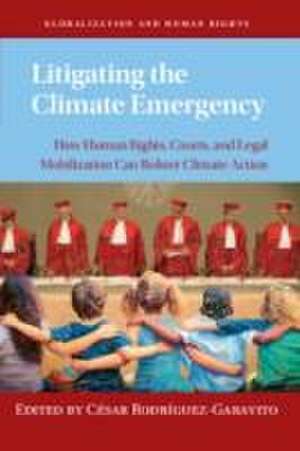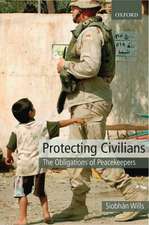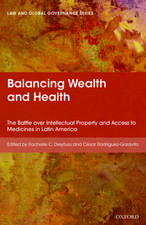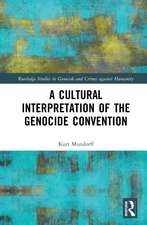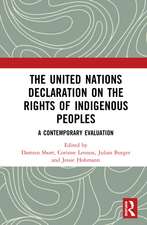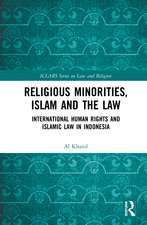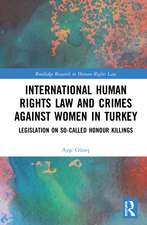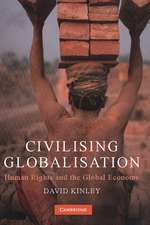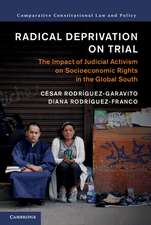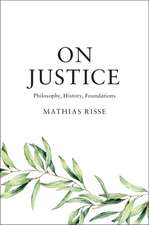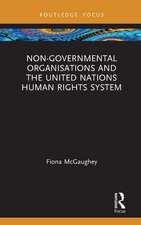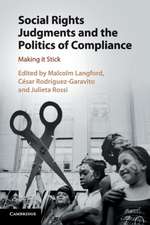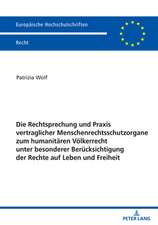Litigating the Climate Emergency: Globalization and Human Rights
Editat de César Rodríguez-Garavitoen Limba Engleză Paperback – 25 oct 2023
| Toate formatele și edițiile | Preț | Express |
|---|---|---|
| Paperback (1) | 217.02 lei 22-36 zile | +22.14 lei 5-11 zile |
| Cambridge University Press – 25 oct 2023 | 217.02 lei 22-36 zile | +22.14 lei 5-11 zile |
| Hardback (1) | 594.83 lei 22-36 zile | +30.79 lei 5-11 zile |
| Cambridge University Press – 2 noi 2022 | 594.83 lei 22-36 zile | +30.79 lei 5-11 zile |
Preț: 217.02 lei
Nou
Puncte Express: 326
Preț estimativ în valută:
41.54€ • 43.29$ • 34.58£
41.54€ • 43.29$ • 34.58£
Carte disponibilă
Livrare economică 16-30 decembrie
Livrare express 29 noiembrie-05 decembrie pentru 32.13 lei
Preluare comenzi: 021 569.72.76
Specificații
ISBN-13: 9781009102155
ISBN-10: 100910215X
Pagini: 430
Ilustrații: Worked examples or Exercises
Dimensiuni: 152 x 229 x 22 mm
Greutate: 0.58 kg
Editura: Cambridge University Press
Seria Globalization and Human Rights
ISBN-10: 100910215X
Pagini: 430
Ilustrații: Worked examples or Exercises
Dimensiuni: 152 x 229 x 22 mm
Greutate: 0.58 kg
Editura: Cambridge University Press
Seria Globalization and Human Rights
Cuprins
Part I. Litigating the Climate Emergency: 1. The Global Rise of Right-Based Litigation for Climate Action, César Rodríguez-Garavito; 2. The Social and Political Life of Human Rights Climate Change Litigation: Mobilizing the Law to Address the Climate Crisis, Lisa Vanhal; Part II. Legal Strategy in Rights-Based Climate Litigation: 3. Thinking Strategically About Climate Litigation, Ben Batros and Tessa Khan; 4. The Quest for Butterfly Climate Adjudication, Catalina Vallejo and Siri Gloppe; 5. Climate Litigation Through an Equality Lens, James Goldston; 6. Two Reputed Allis: Reconciling Climate Justice and Litigation in the Global South, Juan Auz; 7. Staying within Atmospheric and Judicial Limits: Core Principles for Assessing Whether State Action on Climate Change Complies with Human Rights, Sophie Marjanac and Sam Hunter Jones; 8. Litmus Tests as Tools for Tribunals to Assess State Human Rights Obligations to Reduce Carbon Emissions, Ashfaz Khalfan; 9. The Farmer or the Hero? Modes of Climate Litigation in the Global South, Jolene Lin and Jacqueline Peel; 10. The Impacts of High Profile Litigation Against Major Fossil Fuel Companies, Joana Setzer; Part III. Beyond The Law; Science and Narratives in Rights-Based Climate Litigation: 11. Climate Science and Human Rights: Using Attribution Science to Frame Government Mitigation and Adaptation Obligations, Michael Burger, Jessica Wentz, and Daniel Metzger; 12. The Evolution of Corporate Accountability for Climate Change, Richard Heede; 13. Providing Evidence Gap to Support Strategic Climate Enforcement and Litigation, Reinhold Gallmetzer; 14. The Case for Climate Visuals in the Courtroom: The Case for Urgent and Creative Action, Kelly Matheson; 15. The Story of our Lives: Narrative Change Strategies in Climate Litigation, Laura Gyte, Violeta Barrera, and Lucy Singer; Part IV. The Climate Emergency on Trial: Human Rights and Climate Litigation around the World; 16. Courts, Climate Action, and Human Rights: Lessons from the Friends of the Irish Environmnet v. Ireland Case, Victoria Adelmant, Philip Alston, and Matthew Blainey; 17. Closing the Supply-Side Accountability Gap Through Climate Litigation, Michelle Jonker-Argueta; 18. Climate Litigation Before International Tribunals: The Six Portuguese Youth v. 33 Governments of Europe Case Before the European Court of Human Rights, Gerry Liston and Paul Clark; 19. Is There a Brazilian Approach to Climate Litigation? The Climate Crisis, Political Instability and Litigation Possibilities in Brazil, Julia Neiva and Gabriel Mantelli; 20. Climate Change Litigation in India: Its Potential and Challenges, Arpithat Kodiveri; 21. The Tide of Climate Litigation is Upon us in Africa, Pooven Moodley; 22. Pakistan: A Good Story That Can Go Awry If Shortcomings Remain Unacknowledged, Waqqas Mir.
